The blast shook open the door
Interview/Lin Minwen·Photo/Brother Joy
Beirut explosion rescue report
On August 4, 2020, at 6:07 pm local time (11:07 am ET), a big explosion came from the port warehouse in Beirut, the capital of Lebanon, knocking down the building and overturning the vehicle. A second explosion was heard 33 seconds later, and a cloud of fire shot into the sky, shaking the city and the country.
Before that, however, Lebanon was already in crisis. Due to the incompetence of the government, the economy has almost collapsed, and the national poverty rate has reached 50%, forcing people to take to the streets, triggering protests and demonstrations since October 2019. In addition, the COVID-19 epidemic in 2020 has exhausted medical resources, and the burden brought by refugees has not been alleviated.
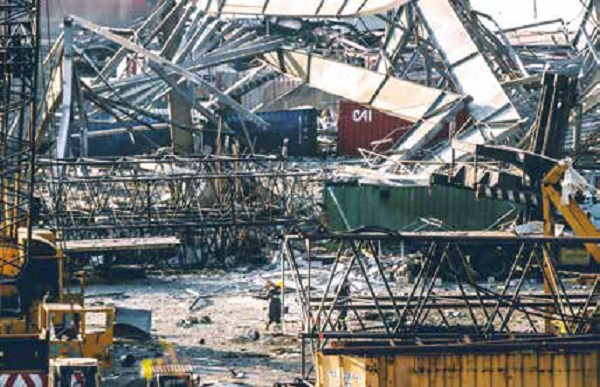
(Image Source:https://images.app.goo.gl/y6KGeLNwHP2PqGLu7)
The portside warehouse has stored 2,750 metric tons of ammonium nitrate for nearly seven years, and there are many fireworks and firecrackers piled nearby. That afternoon, while the workers were welding, sparks fell on flammable materials and the fire spread to ammonium nitrate. The blasting power is equivalent to 1,155 metric tons of TNT (the explosion intensity in Tianjin in 2015 was approximately 256 metric tons of TNT [trinitrotoluene]). The shock wave is enough to destroy buildings within 800 feet and shatter glass doors and windows within 1.25 miles.
The damage of the explosion was not limited to material. According to a Reuters report on August 30, 190 people were killed and 6,500 injured. The livelihoods of many families were also affected. Due to transportation restrictions during the epidemic, there was already a shortage of supplies, and now it is even worse.

The earthquake destroyed the house
First-hand report from Brother Joy of Holy Spirit Church in Beirut:
Just when I got home that day, I heard the explosion and knew something was wrong. The building I live in is about 8 minutes' drive from the port. The explosion shook the whole building, and I thought it might collapse. Then he started calling brothers and sisters in the church and his family members, and learned that some people were seriously injured.
I went to the church to check that night and saw that the damage was not serious. Then I checked the storage warehouse on the two underground floors and found that the seven-foot-high steel door was shaken crooked. The next morning, the brothers and sisters gathered at the storage warehouse, prayed and set off for the city. First, visit friends, distribute food, and help them clean up broken bricks and broken glass.
This trip also showed us that people not only need food, but also need to repair doors and windows. Although it was still midsummer, winter was coming soon, and they needed shelter from the wind and rain!
The three brothers, who were thousands of miles away and scattered in different places, were already familiar with each other because they were committed to cross-cultural overseas missions. They heard about the Beirut explosion on the news and immediately contacted local colleagues to learn about the situation.
Brother Huang Mingfa, the convener of the Bethel Center, has continued to pay attention to the needs of refugees in Lebanon since he visited the Middle East in 2018. He has been there three or four times. He is eager to see if there is any way to help refugee families improve, either by educating children or by giving them skills. With basic living conditions, we can also hear the gospel.
Brother G from the American International Agency for Galilee saw the large number of refugees when he went to Lebanon in 2018. He saw that the crops were ripe, but there were too few people working there. He began to help connect resources and needs, such as raising livelihood supplies and delivering them in containers to refugee camps; introducing situations and encouraging individuals or churches to participate in cross-cultural missions; and raising funds for mission workers.
Brother Cao Song, Director General of the International Chinese Missionary Federation, although he has never been to Lebanon, he has the impression that the country is full of wars. With a vision of world evangelism, when he heard about the rescue plan initiated by Huang Mingfa and Brother G, he immediately devoted himself wholeheartedly.
It is not easy to transport materials during the epidemic, and it is even more difficult to send people there. They connected with local churches and believers, and after understanding the needs, they knew that financial support was the most direct and effective, and the remittance channels were not blocked. On August 11, five organizations jointly established the "Beirut Explosion Relief Ministry" promotion team, including the American International Galilee Agency, Bethel Center, International Chinese Missionary Federation, International Christian Chinese Business Association, and Chicago Chinese Christian Christian missionary meeting. Relief ministry information was distributed through respective publicity channels. The first phase of fundraising goal is US$$50,000, which is estimated to be able to provide food for 1,000 families for a month.
This number was reached in two weeks!
The three brothers and the co-workers of the promotion team were so surprised and excited, and they were even more certain that this was God’s will. So we continued to plan the second phase to raise funds to purchase materials needed to repair doors and windows. The target was set at US$$80,000. This number was also reached at the end of September.
At the same time, after the church in Singapore learned about the rescue plan, with the help of believers engaged in trade and transportation, they purchased coats and blankets. Taking advantage of the convenient location, they raised 21,000 cotton blankets in a short period of time and shipped 20-foot containers in early October. It is expected to arrive in Lebanon in November. Through the promotion of frontline missions, Taiwanese churches also responded to the charity and raised US$$20,000.
Looking closely at the donation list, about 70% came from individual donations. It is not sure where these brothers and sisters got the information. It may have been forwarded through social media, friends of friends of friends. Cao Song once received a call, and a sister who was studying theology forwarded the message to a retired sister. After the two took the initiative to contact them, they sent a check to do a little bit for those in need far away.
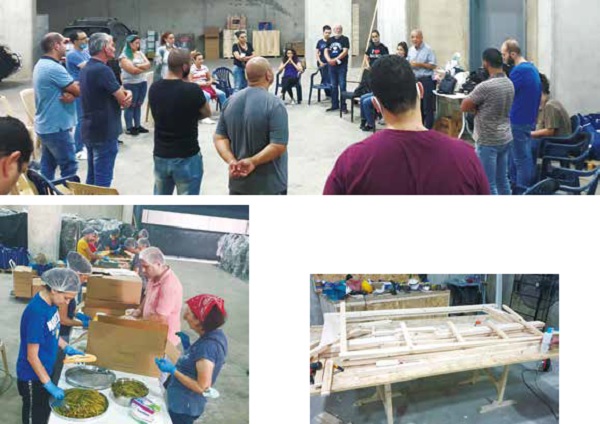
Opened the door to the gospel
Brother Joy in Beirut described the general mobilization of the local church:
After the explosion, the church divided the storage warehouse into two sides. One side was used for food storage and the other side was used as a factory. We purchased wood and aluminum strips and started assembling them into doors and windows. Brothers and sisters are also divided into factory groups and visitation groups. The visiting team, consisting of a small team of three or four, went into the city to visit the affected residents. While delivering food, they also inspected the residences and reported the damage to the factory team. Afterwards, the factory team went to measure the damaged doors and windows, and then came back to make them according to the dimensions and repair them.
The three brothers and the promotion team are not good at charity and fundraising. We were cautious at first because we were unable to visit churches to convey our needs during the epidemic, and we were also worried that many people would be financially affected. Unexpectedly, the response was so enthusiastic and quick. Huang Mingfa seemed to have seen the miracle of five loaves and two fishes - only a little was given, but God accomplished so much.
Donations came from more than 20 organizations and churches and more than 200 individuals in the United States, China, Hong Kong, Taiwan, and Singapore. Inspired by the Holy Spirit, Christians living at home reached out to a strange ethnic group and sent love.
Thanks to the cooperation of long-term local co-workers, it is clear who gets the money, how much it is used for, how it is used, and what else is needed, and stewardship is fulfilled in every link.
After the rescue plan was launched, online prayer meetings began every Friday on August 14. Donations continued to pour in and were remitted in batches; images and oral reports from Beirut were also shared at the prayer meeting. It was learned that even during the epidemic, the local church still gathered every morning to pray, and was later divided into visitation and ministry groups. Some people gave Spiritual reconstruction and the comfort of hope in life, when someone provides practical help, go hand in hand, and the effects are multiplied.
In recent years, Lebanese Christians have been lost due to the flow of immigration, reducing to 1/3 of the population, and Muslims as high as 61% (refer to CIA World Factbook, https://www.cia.gov/library/publications/the-world-factbook/geos/le.html), but it is still the only place in the Middle East where the gospel can be preached freely.
Local co-workers shared that it was originally difficult to get close to Muslim families, but this time the explosion opened a channel to break into the homes, and they were very willing to let "Jesus' people" visit. The visiting team sent food, prayed for the victims, and encouraged and comforted the victims with God’s truth. Then the ministry team came to help clean up the home, help repair damaged parts of the house, and install new doors and windows. In close contact, the gospel was preached and accepted; one person in the family was saved and soon brought other relatives to believe in the Lord.
And the challenges remain serious. Frontline co-workers have been serving non-stop since the explosion. Recently, we learned that some members of local churches and organizations involved have been diagnosed with the new coronavirus. Missionary workers who originally focused on refugee ministry have also turned their attention to rescue operations and are very tired. Let’s look at the general environment in Lebanon. After the explosion, the cabinet resigned and the prime minister stepped down. As of the time of writing, the country is in a state of anarchy, causing social unrest and panic.
Lebanon was originally the most Westernized country in the Middle East, and Beirut was known as the "Little Paris of the Middle East." What kind of cold winter will people living in this land face today?
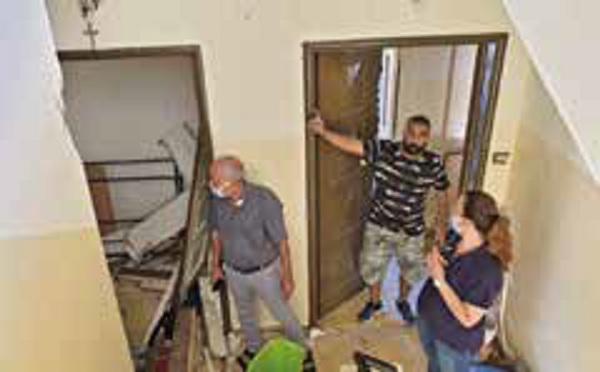
Opened the door to cross-cultural missionary work
Brother Joy recorded the service of Holy Spirit Church:
The Holy Spirit Church was founded in Beirut in 1995 and now extends to the Beqaa Valley in the east, Jbeil in the north, and Tire in the south. The church in Beirut regularly has 200 people attending worship services on Sundays; it also goes to areas where refugees are concentrated to set up schools for refugee children; its charity work includes distributing food, medicine, and daily necessities.
In the past year, the country has experienced many difficulties: political and economic turmoil, wildfires burning mountains, the new crown epidemic... Even so, what is seen is an unprecedented openness to the gospel. Every Sunday morning you can see new friends and families coming to church, believing in Jesus and trusting Him. We have all witnessed the amazing things God has done.
After the explosion, in addition to visiting and building, the brothers and sisters also twice went to the streets of Beirut, facing the port among the rubble, praising God with songs, encouraging residents with messages, and conveying hope with proclamations.
Indeed, there is still much that needs to be done, but there is hope in relying on God.
Hymns of Middle Eastern style echoed in the ruins. Christians raised their hands in the air and offered worship. Surrounded by destroyed walls and exposed steel bars, the pastor firmly declared "Jesus", "Jesus"; he folded his hands and pulled down his mask. residents, listening attentively...
Images of the Holy Spirit Church worshiping in the ruins were transmitted. Brothers and sisters from a church in Atlanta burst into tears when they saw it, and then enthusiastically donated money to support the rescue. Although they do not know each other and are of different races, the Holy Spirit connects the Christians on both sides of the screen and becomes a family. Even if the brothers and sisters in Beirut cannot understand what they say or sing, the Holy Spirit allows the Chinese brothers and sisters in North America to understand their hearts.
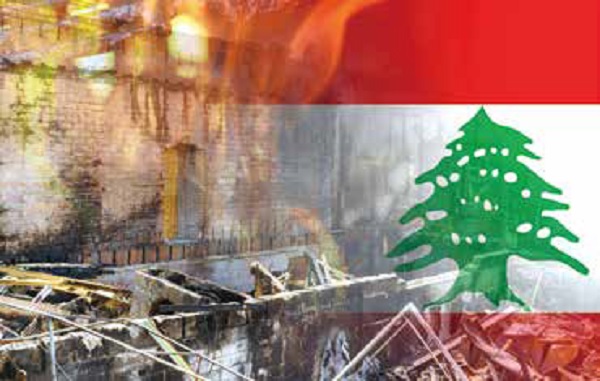
Promote team members to have a consistent vision: the third phase of the plan will focus on the gospel and church revival in Lebanon.
Since God has done great and new things through this rescue plan and mobilized Chinese Christians around the world, will the door for cross-cultural missionary work be opened wide?
Cao Song of the International Chinese Missionary Federation hopes that Chinese church leaders will seize different occasions and channels and always mention the Great Commission: "go," "make," "all nations," and "make disciples." The church is actually very rich in resources, with no shortage of human, financial, and spiritual resources. With vision and ambition, it will have the motivation to bring the gospel to different ethnic groups.
Huang Mingfa of Bethel Center promotes and participates in "doorstep missions" and uses training materials such as the "Seize the Moment" missionary life course to activate Chinese Christians to evangelize their neighbors of different cultures in their own communities. He also suggested that the church start paying attention spiritually and pray for one country and one unreached people at a time during Sunday worship.
In any service, Christians do not need to do it alone. Taking this experience as an example, Brother G from the American International Galilee Agency was deeply inspired by the enthusiasm of brothers Huang and Cao. Their positive attitude and the quick receipt of donations were a sign that God wanted Chinese Christians to take up the missionary mission and spread the gospel to the ends of the earth.

Opened the door to new life
When Huang Mingfa visited Beirut Holy Spirit Church in October 2019, he still vividly remembered the blueprint shared by senior pastor Magdi: establishing a mission center, a discipleship center, and a shelter for disadvantaged groups. It is true that the general environment of the country is gradually declining, and young people have lost hope because they have no way out, but God is the God of repair and reconstruction, and He wants to revive this country amidst the ruins.
After Huang Mingfa returned to the United States, he was unable to contact Pastor Magdi again until he organized a rescue plan and once again connected with the Holy Spirit Church. This experience has made us better understand, trust and understand each other better. He deeply hopes that when the epidemic is over and the rescue is over, more people can be mobilized to visit this country and this region for two or three months at a time to conduct discipleship training and church planting with local churches, so as to cultivate a group of people with the ability to regenerate. of the Legion of Christ.
Chinese Christians were in a strategic position. In the Middle East, where Americans are generally hostile to Americans, black hair and yellow skin are more likely to be accepted. The three brothers who set their sights on cross-cultural missionary work saw that through different channels such as business and education, they could not only contribute to the livelihood of the local people, but also pray that they would embark on the path to eternal life.
The explosion in Beirut undoubtedly pushed Lebanon, which was already in unrest, to the brink of despair, seeming to make matters worse. And isn’t the Chinese church’s rescue just like providing help in times of need?
No matter how harsh the winter is, it will pass; the warm spring breeze will bring full vitality.
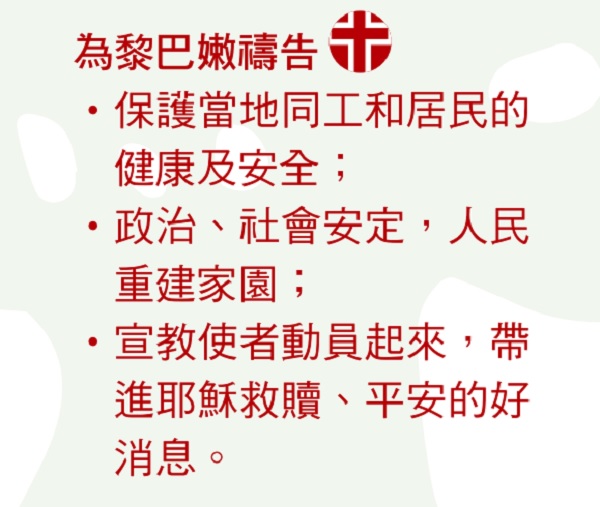
Further reading and related information
‧〈What's happening in Middle Eastern refugee camps?〉, the outreach unit of the 54th issue of this journal.
‧〈Those unforgettable figures〉, the outreach unit of the 56th issue of this journal.
‧ Explosion reference information:https://en.wikipedia.org/wiki/2020_Beirut_explosion;https://www.reuters.com/article/us-lebanon-crisis-blast-casualties/beirut-port-blast-death-toll-rises-to-190-idUSKBN25Q08H.
‧ Worship video in the ruins of Holy Spirit Church,https://www.facebook.com/holyspiritlb/videos/3858085864208349/.
Agencies related to Beirut explosion rescue plan:
‧ American International Galilee Agency (https://www.gi-us.org/whatwedo)
‧ Bethel Center (http://www.bethelrc.org/index.php/9-feature/256-emergency-relief-beirut)
‧ International Chinese Missionary Federation (International Chinese Missionary Federation)http://www.icea-web.org/new/)

